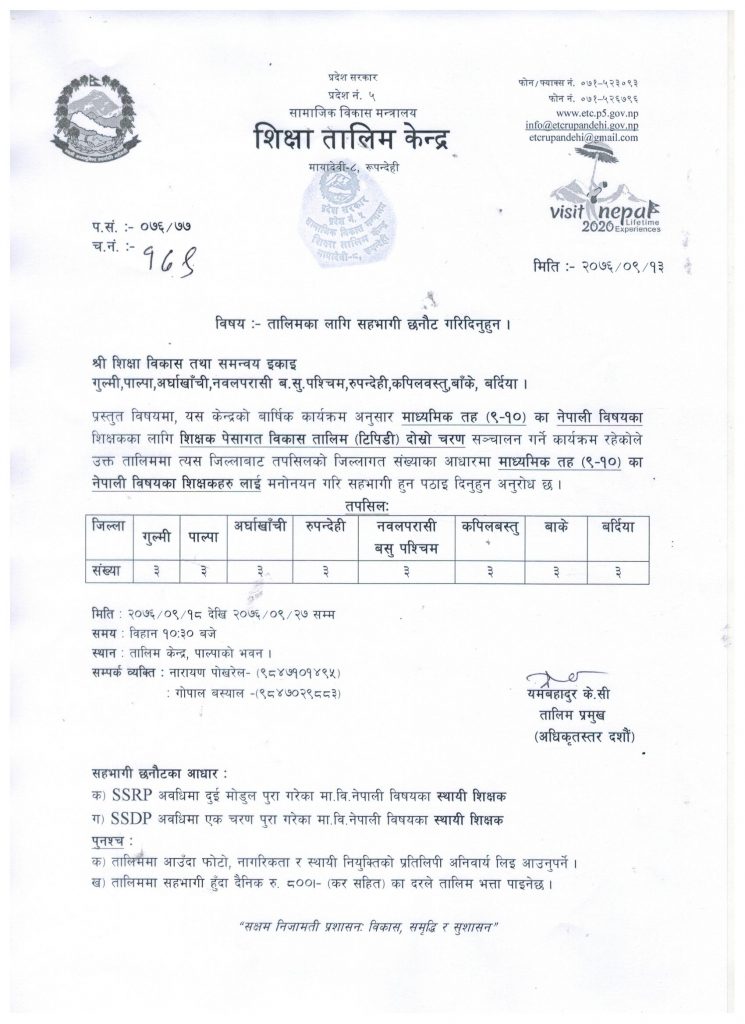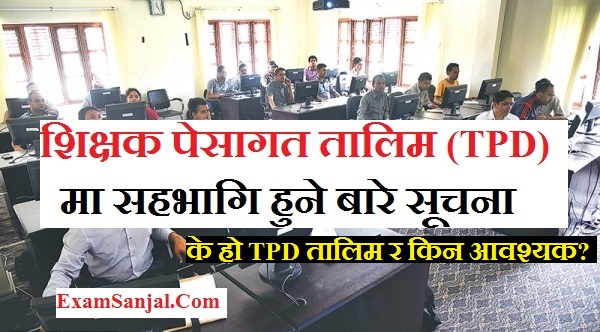Education Training Center, Province 5 Bhairahawa published notice regarding Teacher training- Teachers’ professional Development. All information about teacher training are given below.

Teacher Education
Teacher education is made up of two words- ‘teacher’ and ‘education’. A teacher is a person who teaches the learners or students and makes them acquire knowledge, skills, and attitudes. In a different way, a teacher is a person who facilitates the learners for learning and co-operates with their problems to get them solved which results in the all- round development of the learners. Education is the process of gaining knowledge and wisdom. Thus the collaboration of these two words suggests us the education for the teacher as teacher education. So the process of gaining knowledge and skills for teachers is teacher education.
Teacher education involves the whole process of producing teachers. Teacher education has two broad aspects: theoretical and practical. The theoretical aspect is concerned with collective theoretical knowledge of the profession. It is also concerned with the personal philosophy that a teacher preserves in his/her mind, and that guides his/her teaching behavior. Both of these theoretical aspects set the foundation for teaching. The practical skills and activities are also essential. In teacher education, the teachers involved in model teaching which helps them to gain practical skills which they can use in the real teaching. Teacher education has a broad scope ranging from curricular contents, professional strategies and theoretical frameworks to actions, research, activities and reflective practices. It also includes two aspects- teacher training and teacher development. It initiates from the period of recruitment to the retirement from the teaching-learning process.
Teacher Training
Teacher training encompasses two aspects – preparing teaches about “the content” and “the methodology”. This is to say, the process of preparing teacher about content i.e. ‘what aspect’ and the methodology i.e. ‘how aspect’ is teacher training. It can be pre-service teacher training in which teachers are given adequate training before they enter the field of teaching. The persons who are interested in teaching are involved in this training. They learn different theories, methods, and techniques which are to be used while teaching. They also learn about child development, child psychology, curriculum and objectives which are useful for them for teaching. However, pre-service training alone is not sufficient to produce competent and confident teachers. They may not be provided with everything they need to know. In complement, to pre-service training, another type of training is required which is in-service training. They should be trained from time to time after they enter the real field. As time passes, there are changes in every field along with the educational field. Truth, knowledge, technologies keep on changing. There is the need for in-service training in order to keep the teachers up to date.
Steps of Training
Training plays a vital role in effective teaching. It helps to set the educational plans. It helps to update about the recent technologies and devices which can be used for the teaching-learning activities. It is useful for designing and preparing teaching aids and strategies. The teachers can find out the appropriate teaching methods to teach the students in a child-friendly environment. It is essential for the teachers to acquire knowledge about the objectives, teaching methods, and evaluation system. Thus such an important task should be conducted in a systematic way.
Teachers’ Professional Development
Although the teacher is competent, s/he will continuously have pedagogical problems while teaching. There are teachers with different levels of knowledge, skills, and experience in any school. Mutual sharing of knowledge and experience to each other may help them to acquire professional knowledge and solve the problem. The teacher alone or in collaboration with other teachers can research the problem. This shows that the teachers should be changed from technicians to researchers which help them for their professional development. Teaching professional development is a personal journey in which the teacher involves actively himself or herself to update his/her professional knowledge since knowledge about language and learning is always in a tentative and incomplete state. The new issues such as modern technologies in teaching, local curriculum, Continuous Assessment System, child-friendly environment etc is emerging day by day in the field of education. In order to adjust with such issues, the knowledge which is possible with Teachers’ Professional Development.
TPD in Nepal
NCED has conducted various training and programmes for the teachers in order to improve the quality of education in Nepal. The qualification, knowledge, competency, and capacity of the teachers should be renewed, strengthened and updated. It enables to improve the learning outcomes. Self-evaluation, self-study and involving in different workshops help the teachers to update themselves and improve the quality of education which is the global trend. In regard to this issue, School Sector Reform Programme (SSRP) has made provision of Teachers’ Professional Development (TPD). It has planned to ensure the access of all in-service teachers to the TPD training of 30 days within 5 years. The teachers are to be categorized into Beginners, Experienced, Master and Expert in all levels according to SSRP. It has also proposed TPD training along with qualification, performance, and seniority as the determinants for the promotion of the teachers.
In order to implement its policies, SSRP has proposed the TPD training. IT is a programme which aims to develop professionalism and efficiency in a teacher. The main purpose of this programme is to renew and update the efficiency and knowledge of the teacher as well as to solve the problems raised in the classroom, with the discussion which helps to change the teaching technique and methods. As a result, the learning outcomes will be remarkably increased and improved. It also aims to conduct TPD workshop collecting the demands (problems) of the teachers (which they face while teaching in the classroom) and to solve them by holding a discussion among the subject teachers and rosters. The teachers will implement what they have gained in the training workshop to their classroom. It is aimed that each teacher will be engaged in TPD training from fiscal year 2066/67. The teachers of the basic level will be involved in TPD training workshop in one thousand and fifty-three Resource Centers (RCs). Similarly, the training workshop will be conducted at forty LRCs and twenty ETCs for the secondary level teachers. Each training center or spot is defined as “TPD hub”.
Structure of TPD Programme
The TPD programme consists of three inter-related parts viz Training Workshop, Self-study exercise and Instructional Counseling. A session which is conducted once a year includes 10 days, including all these three parts in aggregation. The module is also prepared including all these aspects in order to complete the professional needs of the teachers. All these parts are complementary so that the TPD programme should be prepared on the basis of this fact. The first part or aspect i.e. Training Workshop will be conducted in a TPD hub in a face to face model. The teachers will be facilitated with the roster trainer which will be of five days. After the completion of the first part, the teacher has to perform the tasks provided in the first part within 20 to 30 days. This part will get three days of credit. On the completion of the second part, the roster trainers will visit the teachers in their schools and evaluate their performance as well as the tasks provided to them for two days. The rosters will also organize the meeting among the teachers and SMC members for discussing the status of the programme. When a teacher completes three times of such ten days programme, s/he will be provided a certificate considering as the completion of a month TPD training.
Recently, the focus of teacher education in the Ministry of Education has shifted from teacher training to teacher professional development with the view to transforming today’s schools from a place of knowledge-transmission to the knowledge-creating/generating space that considers classrooms as a learning-community. This means teacher professional development program has been introduced in our teacher education programs to promote teachers with creative and critical ideas and skills to bring changes in their teaching. Moreover, from this program we have high expectations from the teachers with regard to their personal and professional development. Our planners, who do not have to train and teach, at the policy making level have envisioned bringing substantial changes in current educational scenario by implementing the teacher professional development program.
The term ‘Teacher Professional Development’ (TPD) has already become a buzz-word. People who are working under the Ministry of Education (MoE) always produce this word as it is one of the crucial parts of the MOE’s School Sector Reform Program (SSRP). TPD has already been implemented for three years. People working in the field have experienced both opportunities and challenges of this program.
Voices on-the-ground : We cannot deny the contribution of teacher training to teachers’ professional development. It plays a prominent role in teacher professional development. But, the teachers on-the-ground usually perceive that teacher training and teacher professional development program are synonymous. They think that TPD is the continuation of the previous training programs. This kind of belief system of the teachers, head teachers and PTAs and SMCs create a big gap between the 98.2% data of the trained teachers from community-based schools (NCED-2066) and teachers’ demands about the what ‘aspect’ and how ‘aspect’ of their teaching in the TPD program. I find a significant gap between the expectations of the policy makers and teachers. It is, therefore, necessary to make teachers clear about the difference between training and professional development. Here, I don’t mean to say that training does not have any role for the teachers’ professional development and empowering them. As mentioned above, to a large extent, it facilitates to enhance teachers’ professional development, but the activities and the way they have to be performed in these two areas of teacher education differ largely. Head and Taylor (1997, p. 5) have presented following differences between teacher training and teacher development:


Like!! Really appreciate you sharing this blog post.Really thank you! Keep writing.